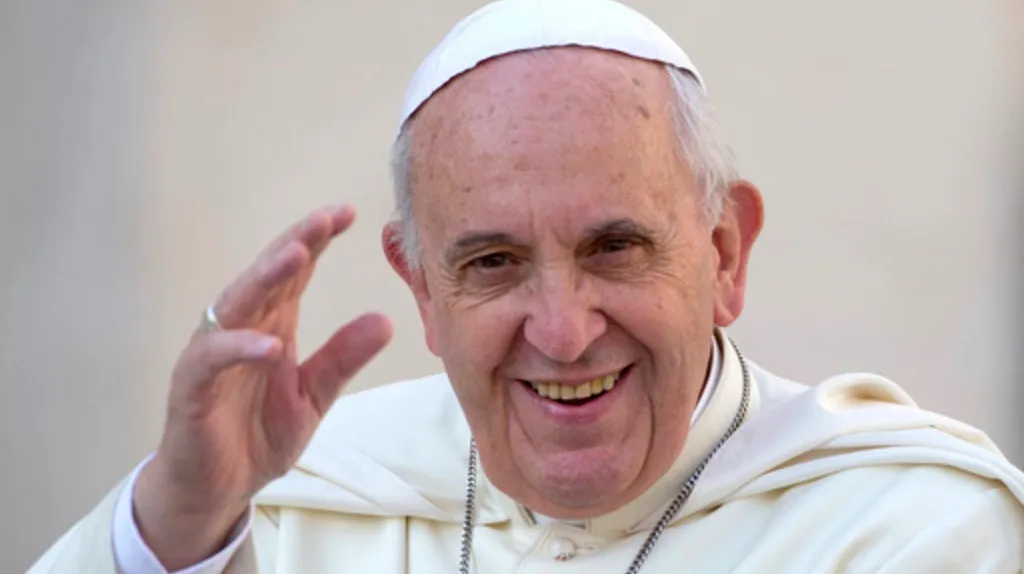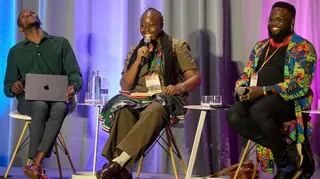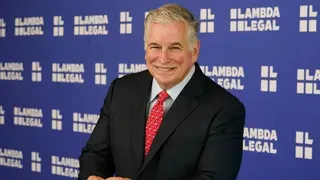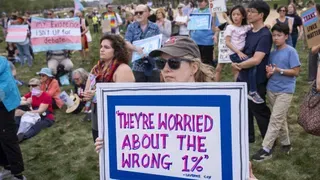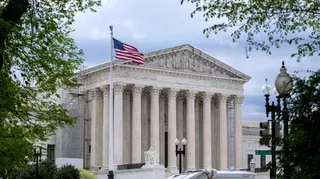August 22, 2011
Gay Christians Seek Out 'Friendly,' Not Just 'Accepting,' Churches
Scott Stiffler READ TIME: 5 MIN.
Despite the well-publicized gospel spread by Fred Phelps and his clan of his tiny Wichita, Kansas, Baptist church, there aren't too many Christian Americans who embrace the Phelp's mantra that "God hates fags."
Many LGBT Christians don't have the luxury of attending a queer-friendly church. Even those who do, often experience that tolerance of their presence at mainstream services doesn't necessarily translate into unconditional acceptance of who they are. The fundamental disconnect within the message that we're to love the sinner and hate the sin often drives LGBTQs of faith out of the pews -- or at least back into the closet while they worship.
Gay-centric churches address this disparity by ministering to those who'd have been right at home amongst the social outcasts championed by Jesus. But does attending a queer church produce the same isolating effect that comes from dejection by mainstream denominations? Some say it's better than the tepid affirmations offered by places of worship that are merely "welcoming."
Rev. Pat Bumgardner, of New York City's MCC Universal Church, says that charged word often promises more than it intends to deliver. "In most cases," she observes, "When you say 'welcoming,' that's what it means. You are welcome to sit in the pews. But if you want to hold your wedding there, if you want to be ordained, often times that's an uphill battle."
Bumgardner notes that most mainstream denominations have some sort of internal group dedicated to queer parishioners. "The Catholics have Dignity. Episcopalians have Integrity, and Lutherans have Lutherans Concerned. But they focus mostly focus on internal politics; the rules and regulations that their denomination abides by." Often, abiding by the church view that homosexual acts are sinful means that gay parishioners can be out-members of the church, but they are expected to lead a chaste lifestyle.
Preaching the Love of Christ
Pastor Vanessa Brown, of the Bronx, N.Y.-based Rivers of Living Faith Ministries, says her congregation gathers for empowerment rather than refuge -- openly acknowledging their existence as sexual (and sexually active) beings. Sure there are those whose reflexively scale back their identity as they enter the doors of a mainstream church.
But, Brown notes, "We can walk in freedom down in the [Greenwich] Village, having a good time. But if you sat down and talked to a lot of church folk, they have an internalized homophobia. They feel like what they're doing is not right, so they won't even come to an affirming church."?
For those who do make it into Brown's church, she says, "I preach the love of Jesus Christ. That is my true message: freedom from all forms of oppression, whether it's sexism, heterosexism, homophobia or racism. Any oppression theology, we reject."
Brown calls the fact her ministry, which was founded as an LGBTQ congregation and remains 90 gay queer, "radically inclusive. We have people who are straight. We do have a few white people who come, even though we're in the urban area of the Bronx. We have Hispanic people, African-Americans, Pan-African Americans, and people of Caribbean descent."
Whether it's one's sexuality or race that informs their identity, Brown preaches the message that "God will always send someone to rescue you in your time of need. I let them know this is a safe space, and I'm not asking them to change anything about themselves." Given that comfort level, she notes, parishioners are more likely to receive the good news of Jesus Christ. Acceptance becomes the agent of change. "I can see the freedom on their faces, that they're not afraid to be affectionate with their partners. They come into the sanctuary and give praise, knowing they don't have to have any internalized homophobia."
Rev. Dr. Patrick S. Cheng is assistant professor of Historical and Systematic Theology at the Episcopal Divinity School in Cambridge, Mass., and author of ""Radical Love: An Introduction to Queer Theology." Although he considers queer-specific congregations as "places where people can come back to their Christian roots without being afraid of what will be said from the pulpit or the reaction of clergy and staff to alternative families," they do have downsides.
"They tend to be smaller in places that are accepting of LGBTQ, people because many of them attend more 'mainstream' denominations and congregations," Cheng noted. "Also, some may feel that Christianity is ultimately about more than sexual/gender identities and therefore being in a welcoming or mixed congregation is more important in terms of the universality of the gospel message."
Senior Pastor Rev. Dr. Durrell Watkins' Fort Lauderdale-based Sunshine Cathedral says that seeking out your fellow queers for worship hardly constitutes a circling of the wagons. "
"I think there's something to be said for a community of people who share your world view," Watkins says. "If I were of German heritage and my family had been Lutheran for generations, I wouldn't feel like I was being isolated to gather with people who are like me on Sunday mornings. So for LGBT people to take pride in who they are and celebrate their heritage, I don't think it's problematic at all. I think people just like to be understood. And who understands you better than people who share your experience?"
Using Gaming Technology
Watkins' ministry will celebrate its 40th anniversary next fall. Extending the outreach mission past its brick and mortal walls, Sunshine Cathedral offers a virtual service (found at secondlife.com) which allows queers of faith to worship in the form of an avatar. That cyber alter ego puts an ironic spin on the notion of declaring one's sexual identity while cloaked in anonymity.
Watkins notes that the virtual reality service appeals to both hardcore gamers and those who are physically isolated from LGTBQ-friendly congregations. "People have an avatar, and those avatars gather for worship in our Sunday evening service." Attendees include "clergy who may be out, but like to have a private worship experience where nobody knows they're clergy," as well as "young people in rural areas where being out is still treacherous.
"People tell us, 'I'm 18 or 19 and I live in South Carolina or Alabama and my family belongs to a very conservative church," Watkins added. "This is a way I can explore my spirituality as the person that I am.' You couldn't necessarily tell your church 'I am gay' and expect them to support you. This is a way for people who can't be out to have some support."
Cheng believes that the basic human need for community must be provided before a meaningful connection to one's God can be made. "In the end," he says, "I think LGBTQ-friendly congregations, whether primarily queer, welcoming, or mixed, are important because they challenge stereotypes that Christians are anti-queer and that queer people are anti-Christian. These are special spaces that need to be nurtured and supported."
Scott Stiffler is a New York City based writer and comedian who has performed stand-up, improv, and sketch comedy. His show, "Sammy's at The Palace. . .at Don't Tell Mama"---a spoof of Liza Minnelli's 2008 NYC performance at The Palace Theatre, recently had a NYC run. He must eat twice his weight in fish every day, or he becomes radioactive.
